by Bernhard Bockelbrink | Nov 4, 2016 | blog, Sociocracy 3.0
Sociocracy 3.0 (a.k.a. S3) is framework for agile organisations, i.e. set of tools for people to collaborate effectively on achieving their shared objectives.
S3 builds on the “Sociocratic Circle Organization Method” (SCM, a.k.a. Dynamic Governance in the US), agile software development and lean thinking, and draws inspiration from many other sources, e.g. the scientific method, Non-Violent Communication, the Core Protocols, Holacracy (another descendant of SCM), psychology, coaching and facilitation techniques.
S3 is a collection of many modular, but mutually reinforcing patterns to promote an agile (i.e. empirical and hypothesis-driven) approach for all aspects of organisations, including coordination of work, making and evolving agreements, effective meetings, governance, building organisations, developing people, organisational structure, organisational development, alignment, and last but not least rolling out and evolving S3 patterns.
A pattern is a template for addressing specific situations or challenges, which can be adapted to context as needed (there’s even a specific pattern for doing that). All of the currently more than 65 patterns in S3 are guided by seven principles: empiricism, consent, equivalence, effectiveness, accountability, continuous improvement and transparency.
A culture of collaboration
S3 is about building a culture of collaboration that is aligned to people’s natural drive for purpose, autonomy and mastery, but also caters to another equally important aspect that is often ignored in the discussion: everyone’s basic need for relationship and belonging. S3 brings people closer together by integrating diverse personalities and points of view into solutions for complex problems – building respect and trust in each other along the way.
We believe that an effective organisation is one that is easy to change. To that end, rather than implementing a rigid system of rules and policy, S3 aims to support people in building self-accountability and discipline required to make just as many agreements as are needed to be effective, and evolve them as necessary, periodically eliminating those agreements which are no longer helpful.
S3 and other agile methods
While other agile frameworks and methods usually focus on software development and project management, and mostly omit the questions of management and governance, organisational structure and organisational change, S3 brings agile thinking to all aspects of an organisation. It aims to solve some interesting challenges: how can we create a coherent agile culture throughout an organisation that is not limited by hierarchical structures or traditional ideas of management (which we know are incompatible to agile), and how can the people in agile organisations thrive, and at the same time discover and develop resources and skills to effectively contribute to a flourishing organisation.
S3 complements the Lean Startup Method, Scrum, eXtreme Programming, Software Kanban (both on a team level and Enterprise Kanban), SAFe, DAD, LeSS, OpenAgile and many other agile and lean methodologies, and it even provides a way to adapt and evolve those methodologies, when an organisation outgrows them.
How to start
The pattern-based approach of S3 allows for an agile (and more common-sense) approach to organisational change: we invite organisations to keep doing what they do well, and only change where there’s a need to evolve, by pulling in one or several of S3’s patterns to resolve actual challenges they’re facing. This way, an organisation can organically grow and adapt to change, at their own pace, which is a stark contrast to the revolutionary change that is is mandated by the all-or-nothing approach of e.g. Scrum or Holacracy, which poses a great risk to organisations, but makes a great business model for consultants.
Any organisation experimenting with agile is most likely already familiar with several of the patterns contained in S3, e.g. working from a prioritised backlog, or visualising work (usually on a Scrum board or a Kanban board) or holding retrospectives. What often helps agile teams take things to the next level are the S3 patterns around making and evolving agreements. Take for example Consent Decision Making, which can be used to evolve policy in teams implementing Kanban, or product or architecture decisions in a Scrum team. When scaling agile development, teams can use structural patterns like the Delegate Circle or the Service Circle to align their efforts across teams, e.g. around the functions of architecture or product decisions. This is often combined with the pattern for selecting people to roles to determine who best represents each teams in these circles.
There’s a brief overview over all patterns at the S3 site, and a beta version of the upcoming S3 handbook with more detailed descriptions for many patterns at https://evolvingcollaboration.com/sociocracy-3-0-patterns-ebook/
What’s next?
As more and more organisations experiment with S3, the framework will be expanded with more patterns, and existing patterns will be refined and updated with variants which proved to be useful. One example for this is the Driver Mapping pattern, which was discovered and evolved as organisations wanted to dive deeper into S3 and needed a way to identify a circle structure that would make their organisation more effective.
by Bernhard Bockelbrink | Oct 8, 2016 | blog
I have created a set of templates in Google Sheets for online facilitation of S3 patterns:
- Proposal Forming
- Consent Decision Making
- Proposals/Agreements
The templates contain some instructions to get you started, and are laid out for up to 9 participants (but can easily be extended to accommodate more). Simply make a copy of the template and give access to all participants.
Templates follow the vting format, so participants will record their own contributions in the document while communication through an audio connection (e.g. Skype, Google Hangout, Teamspeak or phone), Even if some people are in the same room, make sure everyone has their own computer and audio connection, preferably through a headset (the cheapest one that came with your phone will most likely give everyone better audio quality than the most expensive conference speaker and microphone).
Click here to make a copy of the template and start experimenting
As always, I’m curious for your feedback bernhard.bockelbrink@gmail.com
The templates are licensed under a Attribution-ShareAlike 4.0 International (CC BY-SA 4.0) License.
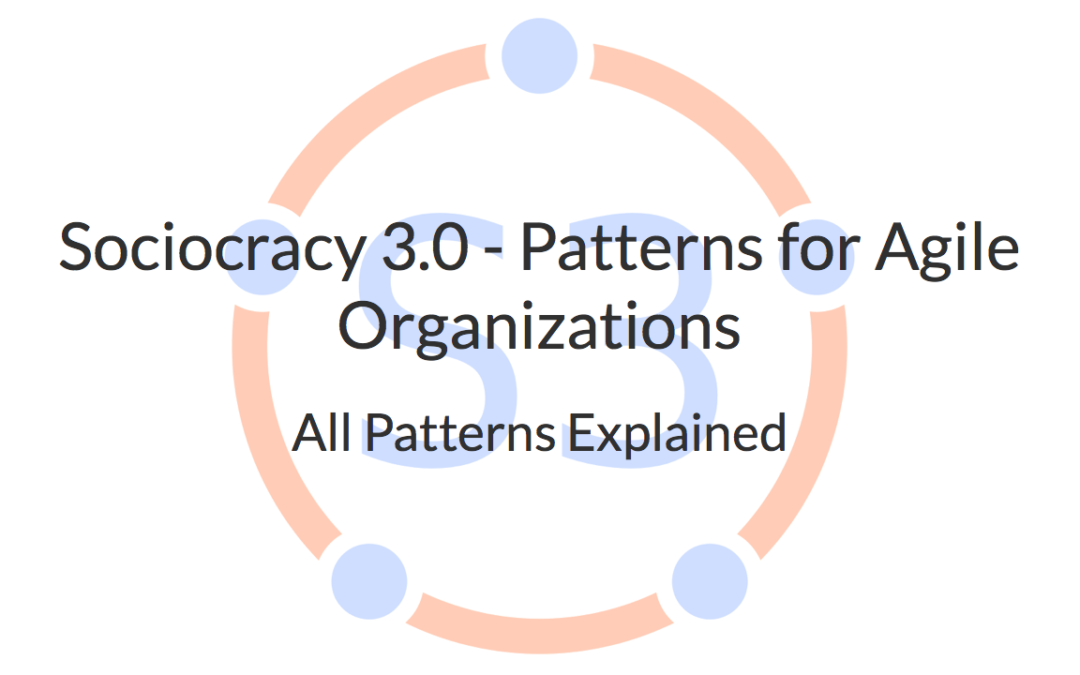
by Bernhard Bockelbrink | Aug 24, 2016 | blog, slide deck, sociocracy, Sociocracy 3.0
Updated 2017-01-30
download pdf download slides as png
A slide deck with descriptions for each of the patterns in Sociocracy 3.0 via the S3 webiste.
by Bernhard Bockelbrink | Jun 29, 2016 | blog, Sociocracy 3.0, workshops/trainings
Am Dienstag, 15. November 2016, 10:00 – 18:00 Uhr, in Berlin.
Anmeldung und weitere Details zur Konferenz: http://www.manage-agile.de/workshops/articles/gtws-4-agile-hr-mit-sociocracy-30.htm
Der wesentliche Erfolgsfaktor für agile Unternehmen (und solche, die es werden wollen), sind Mitarbeiter, die entweder bereits ein agiles Mindset besitzen und danach handeln, oder sich zumindest in diese Richtung entwickeln, im Idealfall selbstmotiviert und selbstorganisiert.
Einstellung und Entwicklung von Mitarbeitern wird jedoch in den meisten Unternehmen von HR-Abteilungen gesteuert, die selbst nicht agil arbeiten, die also – wenn überhaupt – nur theoretische Kenntnisse zum Thema Agilität besitzen. Und obwohl das Thema HR essentiell für agile Transitionen und für agile Unternehmen ist, beschäftigen sich die bekannten agilen Methoden und Vorgehensmodelle bisher nicht oder nur sehr oberflächlich damit.
Sociocracy 3.0 (a.k.a. S3) ist ein offenes agiles Framework für alle Organisationsbereiche, das bereits einige konkrete Patterns für selbstorganisierte HR-Prozesse mitbringt. Dadurch wird es möglich, sich mit S3 dem Thema “agile HR” auf ganz unterschiedliche Arten zu nähern: so können agile Teams ihre HR-Prozesse einfach selbstorganisiert gestalten, Teams und HR können ihre Zusammenarbeit verändern, und HR-Teams oder -Abteilungen können selbst nach agilen Prinzipien arbeiten.
Ziel des Workshops ist es, die Teilnehmer dabei zu unterstützen, konkrete Ideen zur Umsetzung “agiler HR” im eigenen Unternehmen zu entwickeln. (more…)

by Bernhard Bockelbrink | Jun 22, 2016 | blog, download, eBooks, Sociocracy 3.0
S3 has evolved significantly since this page was published, and we could not catch up with the handbook, so for now I removed the download linkls. The latest version can be found in the slide deck “All Patterns explained” or on http://sociocracy30.org.
Earlier this year I had compiled a handout for the participants of my workshops with descriptions of S3’s essential patterns. Over time, I updated the handout with the contents of the “All Patterns Explained” slide deck, several of my drafts for the upcoming book The Sociocracy 3.0 Handbook” I am writing together with James Priest, and other documents. Now grew beyond the scope of a handout, since it contains more than 100 pages, a section for each of the 65 patterns, an introduction and a changelog so you can see what’s new.
Until the “official” Sociocracy 3.0 handbook is ready, I will maintain this document as a beta version of the handbook and I will keep on updating it with more content and illustrations document, and include the “official” pattern descriptions as James and I finish them.
(more…)
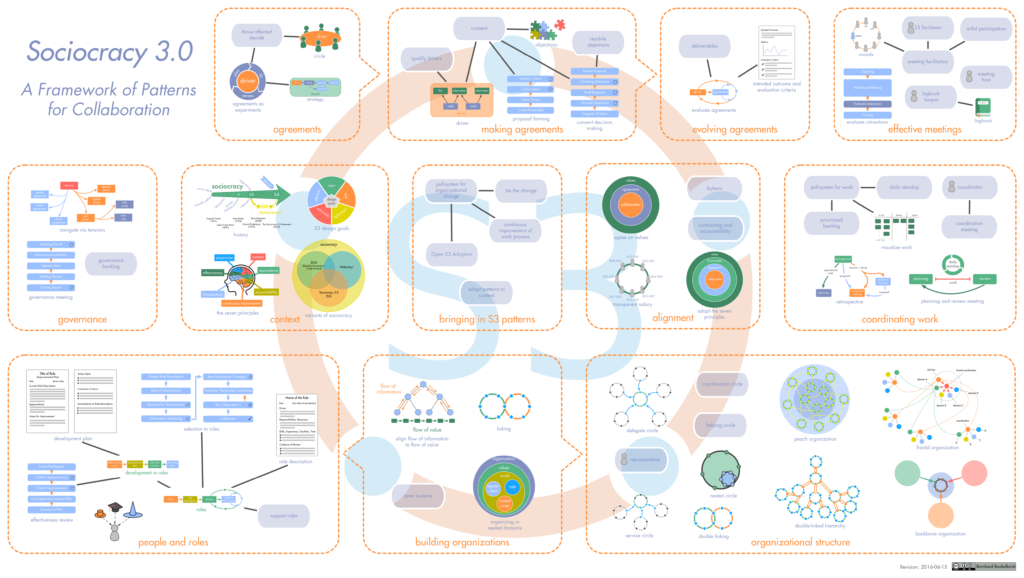
by Bernhard Bockelbrink | Jun 22, 2016 | blog, Sociocracy 3.0
With more than 60 patterns, Sociocracy 3.0 has grown quite a bit in the past year. I have created the big picture to illustrate how it all fits together. As always, this is a work in progress, some patterns don’t have illustrations yet.
It’s available for download as small and medium png files, and as a high-resolution pdf

(more…)
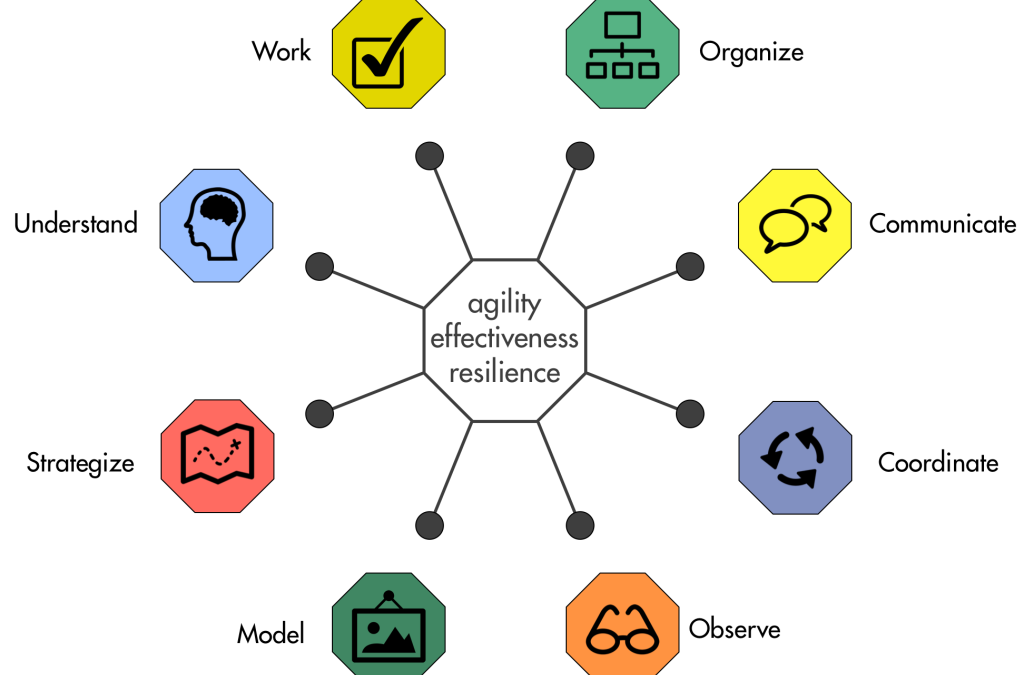
by Bernhard Bockelbrink | May 13, 2016 | blog, Sociocracy 3.0
A few days ago I had a workshop with Alexander Tornow and Volker Schad, where Alexander presented Stafford Beer’s Viable System Model (VSM), I explained S3, and then we discussed how S3’s patterns relate to systems 1-5 of VMS.
I don’t claim to understand VSM in its entirety, and I must admit I remain unconvinced that an organization follows the same basic principles as the human body, but I think VMS is an interesting and useful model, at long as you don’t confuse the map with the territory.
The workshop inspired me to create an model of the functions an organization must implement, both on an organizational level, and within its individual parts, in order to be effective, agile and resilient. It’s interesting to see how S3’s patterns can be mapped to that model: (more…)
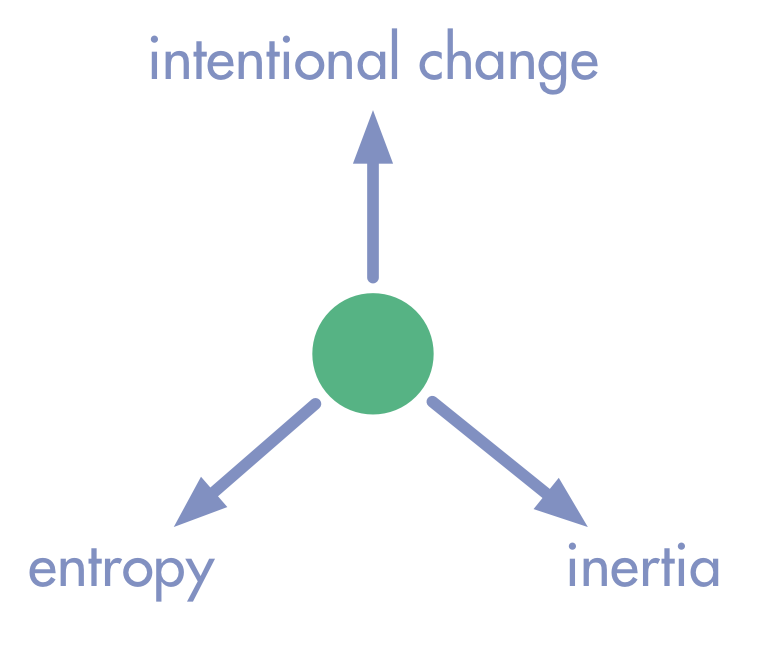
by Bernhard Bockelbrink | May 7, 2016 | blog, Change, eBooks, Sociocracy 3.0
download pdf download ePub
Introduction
Change in organizations is inevitable and happens naturally as organizations adapt to the various forces pulling at the organization, from the outside and from within.
However, most of the changes that take place in organizations are neither intentional nor aligned across the organization, they happen locally as a result of many small choices made by many individuals.
Lots of small and unrelated adaptive changes will lead to giving in to inertia (doing more of the same) and entropy (many independent and unaligned decisions). This is the opposite of intentional change – changing in an organized and aligned way.
All organizations benefit from building capacity for intentional change in order to become and remain effective.
This paper presents a simple model for mapping influence of internal and external forces to organizations, identifying motive for change and delegating accountability for plotting a course of action, and finally incrementally implementing the resulting change. (more…)
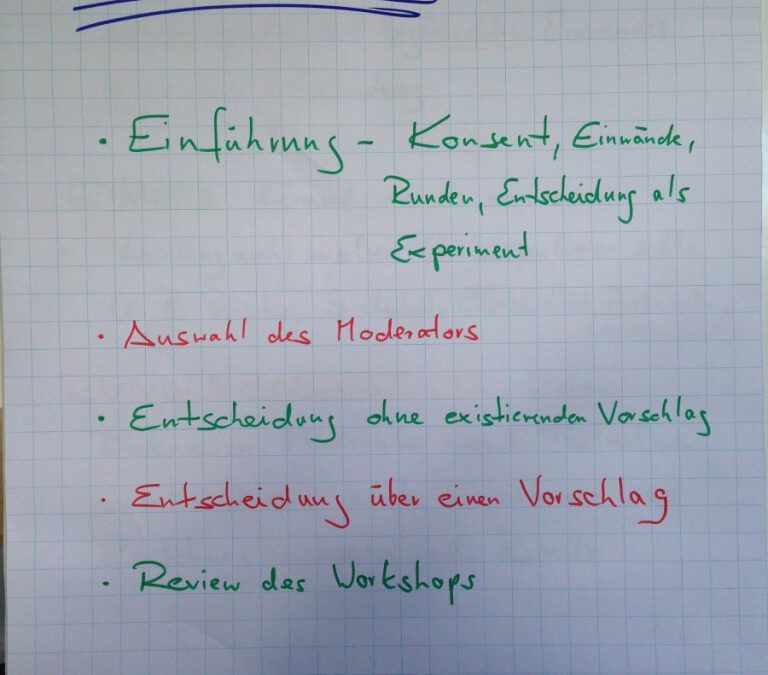
by Bernhard Bockelbrink | Apr 17, 2016 | blog, Sociocracy 3.0, workshops/trainings
Für alle, die die Flipcharts nicht fotografiert haben, die Fotos als pdf zum Download oder unten zur Ansicht. Detailliertere Materialien dazu gibts auf sociocracy30.org.
Vielen Dank an die Teilnehmer! (more…)
by Bernhard Bockelbrink | Jan 19, 2016 | blog, distributed organizations
This is a collection of short reviews of software tools to facilitate online collaboration. The use cases I have been looking at are as follows:
- virtual team events (like planning, reviews, retrospectives, daily standup, proposal forming, navigation meeting, trainings or topical workshops)
- asynchronous collaboration of virtual teams
- virtual coaching sessions
- webinars
(more…)






